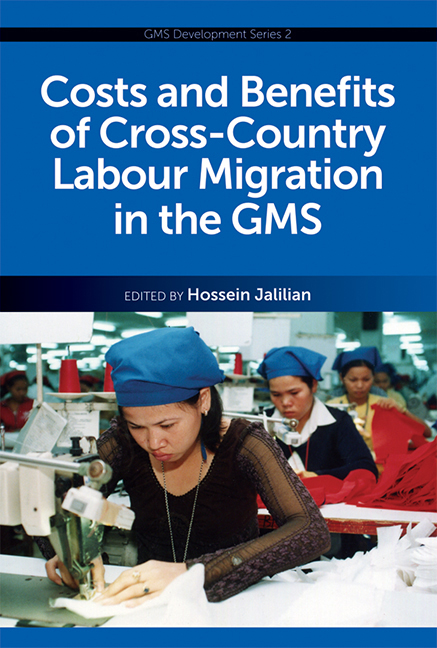Book contents
- Frontmatter
- Contents
- Acronyms and Abbreviations
- List of Figures, Tables and Boxes
- List of Contributors
- 1 Migrants of the Mekong: Wins and Losses
- 2 Economic Costs and Benefits of Labour Migration: Case of Cambodia
- 3 Economic Costs and Benefits of Labour Migration: Case of Lao PDR
- 4 Economic Costs and Benefits of Labour Migration: Case of Thailand
- 5 Economic Costs and Benefits of Labour Migration: Case of Vietnam
- 6 Migrants of the Mekong: Lessons
- Index
4 - Economic Costs and Benefits of Labour Migration: Case of Thailand
Published online by Cambridge University Press: 21 October 2015
- Frontmatter
- Contents
- Acronyms and Abbreviations
- List of Figures, Tables and Boxes
- List of Contributors
- 1 Migrants of the Mekong: Wins and Losses
- 2 Economic Costs and Benefits of Labour Migration: Case of Cambodia
- 3 Economic Costs and Benefits of Labour Migration: Case of Lao PDR
- 4 Economic Costs and Benefits of Labour Migration: Case of Thailand
- 5 Economic Costs and Benefits of Labour Migration: Case of Vietnam
- 6 Migrants of the Mekong: Lessons
- Index
Summary
INTRODUCTION
Migration is a global phenomenon and is both beneficial and detrimental to most countries. At the macro level, emigration can reduce unemployment and attract extra income through remittances (income sent home) to home countries, which can in turn contribute to development and help reduce poverty. Additionally, emigrants often return with new ideas and technology. Immigration increases labour supply and occupational mobility while reducing wage-push inflationary pressure. This can lead to more productive uses of capital, increased exports, and greater economic growth. On the other hand, migration can lead to a “brain-drain” as educated and talented individuals take their skills elsewhere. Labour shortages, increased wage costs and reduced economic growth are also problems for countries with high emigration. An increased flow of immigrants into a country places great strain on infrastructure and public services such as housing facilities, schools, and medical services.
At the micro level, remittances bring great economic benefits to recipient individuals and can improve their well-being. However, the social costs can also be huge for both the migrant and the family left behind. The loneliness and homesickness often experienced by the migrant can lead to deterioration in physical and mental health, exacerbated by the lack of local language skills that can leave migrants feeling isolated. At home, marriages can break down and children are forced to live without their father or mother for long periods of time. Migration also exacerbates problems such as the spread of HIV/AIDS and crime.
Despite its obvious impact and importance, there is a lack of information about the costs and benefits of migration in many countries. More research is needed to help formulate new policies on migration and strengthen existing ones. This country study, along with its partner studies in Lao PDR, Cambodia, and Vietnam, aims to help fill this information gap by providing an evaluation and comparison of the benefits and costs of migration in Thailand. It focuses specifically on the economic costs and benefits, but does touch on social issues as well.
- Type
- Chapter
- Information
- Costs and Benefits of Cross-Country Labour Migration in the GMS , pp. 242 - 304Publisher: ISEAS–Yusof Ishak InstitutePrint publication year: 2012

